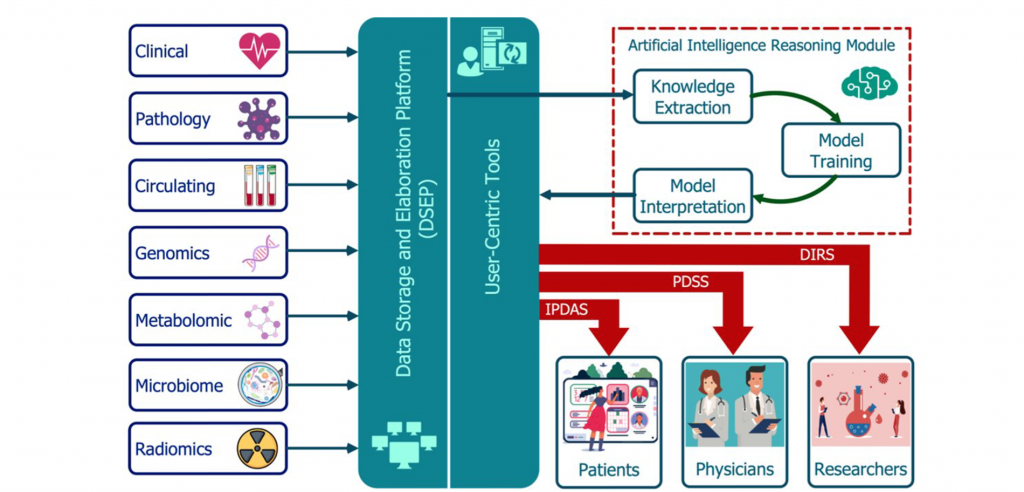Can Artificial Intelligence be used in clinics?

Artificial Intelligence in our daily lives
Artificial Intelligence (AI), despite being perceived as something straight out of science fiction, is present in our daily lives more than we think. From unlocking our phones with just a glance, to when we ask our virtual assistant for tomorrow’s weather, to using our favorite navigation app to find the less congested route… AI is there to make our lives easier and more efficient.
AI refers to the simulation of human intelligence in machines that are designed to perform tasks that would typically require human intelligence. AI systems are trained and improved over time to perform these tasks with a vast amount of data. The ultimate goal is to be able to get machines to perform certain tasks at a higher level, more accurately and efficiently.

Online Chat Bot assistant answering questions
Artificial Intelligence in the healthcare system
AI, thanks to the evolution of computer science, has made its way into the healthcare field, changing the way clinics and hospitals work.
One of the primary ways AI is supporting medical professionals is in diagnosis. With the help of AI algorithms, healthcare providers can quickly and accurately diagnose diseases, helping them to make more informed treatment decisions. AI can also assist in identifying patterns and correlations in medical data, identifying the symptoms of some diseases and matching them with specific conditions.
Another way AI is being used in clinics is for treatment planning. With AI algorithms, patient data, such as medical records, lab results and imaging studies can quickly be analyzed to determine the best treatment possibilities for a specific patient. This can help healthcare providers to personalize patient care and optimize the use of resources, improving patient experiences.
AI can also be used for predictive analytics, which involves using AI to analyze patient data and make predictions about future health outcomes. This can be particularly useful in identifying patients who are more prone to developing a particular condition, allowing intervention before the condition becomes serious.
Other ways in which AI has revolutionized the healthcare industry include:
- Increased efficiency: AI technology is able to perform repetitive and time-consuming tasks, freeing up healthcare professionals to focus on other and more critical aspects of patient care.
- Cost saving: as AI improves accuracy, it also reduces the time needed for manual analysis, optimizing resource utilization, and helping reduce the overall cost of care.
- Improved outcomes: because AI assists healthcare providers in making better treatment decisions, patients can have an improvement in their outcomes and their quality of life.
In conclusion, the integration of AI technology into the healthcare system has allowed the field of medicine to receive new and better tools to improve accuracy, efficiency and patient outcomes.

Medical technology presented on a virtual screen
I3LUNG and how AI can be used in the treatment of lung cancer
The I3LUNG project aims to provide reliable tools to patients suffering from metastatic non-small cell lung cancer (mNSCLC) through the integration of vast amounts of data from 2000 patients. This integration will be achieved by the usage of AI and Machine Learning (ML), a subfield of AI.
The project involves close collaboration with physicians and AI/ML experts with the aim of changing clinical practice in the NSCLC setting and beyond.
The ultimate goal of the I3LUNG project is to study the individual response of patients to immunotherapy, a cancer treatment that utilizes the body’s own immune system to fight and eliminate the tumor.
Not all patients respond favorably to immunotherapy, and in some cases, it can lead to toxic side effects while representing a substantial cost to the health system.
In this context, I3LUNG arises, together with AI and ML to help predict patients’ individual responses to immunotherapy, considering their specific needs, and providing them with tailored therapies that represent the best possible option for their specific situation. This will not only improve the patient’s well-being and quality of life but also help reduce the economic impact of the treatment.
Patients are the focus of I3LUNG, and as such, they will take part in the decision-making of their treatment and will be followed by psychologists during the study to collect their feedback. Understanding their thoughts on the use of AI for their cases will allow to steer the project in the best possible direction.

I3LUNG platform, tools, and overall structure. The AVATAR based platform and the AI/ML based tools
For more information, please visit the Project section on our website and for any doubts, contact us!
Stay tuned for more information and don’t forget to follow us on our social networks:
LinkedIn | Twitter | Instagram | Facebook
Share on:
